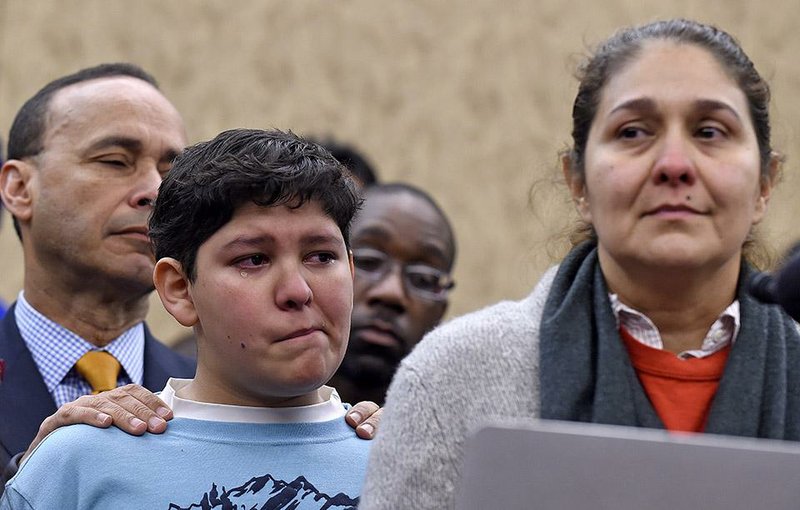WASHINGTON -- The House ignored veto threats by President Barack Obama on two fronts Wednesday, voting to undo major provisions of the administration's immigration policy and to roll back banking constraints enacted after the 2008 financial crisis.
Both measures face an uncertain path in the Senate, even with Republicans in control of the chamber, because the GOP is six votes shy of the 60-vote majority needed to advance most legislation in the chamber.
The president's opposition to the bills has cast doubt on hopes for a new era of bipartisan compromise and productivity in Washington. The moves have irked GOP leaders, who believe they have a midterm-election mandate to negotiate with Democrats and pass legislation after years of inaction.
Wednesday's action on immigration came at the start of negotiations with the Senate over funding for the Department of Homeland Security, which expires at the end of February. Amendments to the funding bill would expose hundreds of thousands of illegal aliens to expulsion from the U.S.
Even allies of House Speaker John Boehner say the broader measure passed Wednesday in a 236-191 vote has little chance of success because Senate Democrats are unlikely to support it and Obama would veto it over the immigration amendments.
Meanwhile, the new banking bill passed Wednesday was opposed by Obama and most Democrats largely because of its revisions to the so-called Volcker rule, a centerpiece of the 2010 Dodd-Frank financial overhaul that prohibits banks from trading for their own profit and limits their ownership of risky investments.
The bill passed the House in a 271-154 vote. It's unclear whether the Senate will take up the measure or whether opponents, led by Elizabeth Warren, D-Mass., have enough votes to filibuster it.
The four members of Arkansas' all-Republican House delegation voted for both bills, saying Congress has an obligation to push back against the president's actions.
Rep. Steve Womack of Rogers said in a statement after the passage of the bill containing the immigration provisions that Obama was trying to legislate from the Oval Office.
"House Republicans made a promise to the American people to stop this blatant overreach when reinforcement arrived in the Senate, and I applaud the passage of this bill, which makes good on that promise with careful cuts and tough policy changes," he said.
"The president needs reminding that we have three, co-equal branches of government, and our action today serves notice that we will restore the legislative branch to equal status," Rep. Bruce Westerman of Hot Springs said in a statement.
U.S. Rep. French Hill said in a statement that the bill "repeals the President's unlawful executive overreach on immigration policy that has worsened our illegal immigration crisis, violated the Constitution, and punished those who have come to this country legally."
Rep. Rick Crawford said more changes are needed in the Homeland Security Department.
"I believe this should not be the last effort undertaken to address funding and reforms at the Department of Homeland Security," he said in a statement.
The immigration moves were attached to a bill that would provide $39.7 billion to finance the department through the rest of the budget year, legislation that lawmakers of both parties said was sorely needed to pay for counterterrorism, cybersecurity and other priorities at a moment when terror attacks in Paris have underscored dire threats.
One of the immigration amendments, approved 237-190, would undo executive actions that Obama announced in November to provide temporary deportation relief and work permits to up to 5 million illegal aliens, mostly people with children who are citizens or legal permanent residents.
The amendment also would cancel earlier directives to immigration agents aimed at giving them discretion in focusing deportations on criminals.
Another amendment, passed by the House on a 218-209 vote, would delete Obama's 2012 policy that has granted work permits and stays of deportation to more than 600,000 illegal aliens who arrived in the U.S. as children. More than two dozen Republicans, some representing large Hispanic populations, joined Democrats in opposition.
Many Republicans who supported the legislation said the debate was not about immigration but about the president's exceeding his authority by rewriting immigration law on his own.
"By their votes last November, the people made clear they want more accountability from this president -- enough is enough," Boehner said, addressing the House chamber before the vote. "By our votes here today, we will heed their will."
In addition to rolling back Obama's actions, the bill is also an attempt to shore up support among Republicans to proceed to a broader overhaul of U.S. immigration laws. House Homeland Security Committee Chairman Mike McCaul, R-Texas, is drafting a border-security bill that the GOP plans to use as a vehicle to advance immigration priorities, including an expansion of high-tech worker visas.
Democrats on Wednesday accused Republicans of putting homeland security funding at risk by attaching the amendments on immigration, and some Republicans voiced the same concern. But House GOP leaders accused Obama in turn of reckless and unconstitutional actions on immigration that had to be answered.
Some centrist GOP lawmakers also expressed frustration that even with a bigger party majority in the House, the most conservative lawmakers are still calling the shots, successfully pushing leaders for the vote to undo the 2012 policy.
"If we were just specifically dealing with the November overreach of the president, you'd have Democrats who'd be voting with us on that piece of it, but we've gone well beyond that," said Rep. Jeff Denham, R-Calif. "We're passing a bill for political reasons, a bill that has no ability to pass the Senate."
Two Democrats joined Republicans in voting for the package, but most condemned it.
"Not funding DHS is dumb and dangerous," said Rep. Zoe Lofgren, D-Calif., who has been a champion for immigration policy changes. She said the Republican package "would break apart families."
Democratic Rep. Luis Gutierrez of Illinois warned Republicans they were igniting "the mobilization of an immigrant community throughout this nation that will be the death knell to the future of your party."
Senate Minority Leader Harry Reid, D-Nev., said in an emailed statement that the bill won't pass in his chamber. House Republicans are "picking an unnecessary political fight that risks shutting down the Department of Homeland Security and endangering our security," he said.
Even if the bill passes in the Senate, the White House has promised to veto any legislation that tries to roll back the president's changes in immigration policy. Veto threats also have been issued against a bill authorizing construction of the Keystone XL oil pipeline that passed the House last week and the banking bill that passed Wednesday.
"The president seems to think we should start only by presenting the ideas that he likes," said Rep. Tom Cole, R-Okla., an ally of GOP leaders, in reference to the veto threats. "He's the president of the United States -- he's not the emperor of the universe."
Attack on Dodd-Frank
The banking bill alters sections of the 2010 Dodd-Frank financial overhaul. That law had tightened government oversight of banks and financial markets with an eye toward preventing another crisis and another taxpayer bailout of banks.
At the height of the financial crisis in late 2008, the government stepped in to rescue crippled banks -- including the largest Wall Street institutions -- with hundreds of billions of dollars in taxpayer money.
Republicans in the House have been trying for years to chip away at the Dodd-Frank law, which Congress enacted with mostly Democratic support. Republicans have denounced the law as an excessive expansion of regulatory authority that's stifling the competitiveness of the financial industry.
The bill revises the Volcker rule, which would limit banks' riskiest trading bets. That kind of risk-taking on Wall Street helped trigger the 2008 crisis.
Most notably, the measure passed Wednesday would give U.S. banks two extra years -- until 2019 -- to ensure that their holdings of certain complex and risky securities don't put them out of compliance with a new banking rule.
The White House issued a veto threat Monday, saying the bill "would weaken and undermine" the Dodd-Frank law. Referring to the proposed two-year delay, the White House said in a statement, "Taxpayers should not have to wait that long to have limits in place that protect them from risky practices."
Some Senate Democrats began raising objections Wednesday as the House acted.
Sen. Sherrod Brown of Ohio, the new senior Democrat on the Senate Banking Committee, called the bill "another attempt by House Republicans to advance Wall Street's interests at the expense of the American people."
"Rolling back protections that safeguard against practices that nearly crippled our economy creates unnecessary risks for taxpayers and investors," Brown said in a statement. He will work with Banking Committee Chairman Sen. Richard Shelby, R-Ala., on legislation related to banking and financial regulation. Warren, the Massachusetts Democrat, also is a member of that panel.
Republican proponents insisted the new legislation would reduce the regulatory burden on small businesses and spur creation of new jobs.
"These are smart, technical reforms to an overly burdensome law, Dodd-Frank, that are bipartisan," said Rep. Michael Fitzpatrick, R-Pa., who sponsored the package of changes.
"These regulations may have been targeting Wall Street, but their burden falls heavily on Main Street," he said.
Rep. Andy Barr, R-Ky., noted the House bill "doesn't do away with the Volcker rule" but simply makes some changes needed to help banks and make sure credit remains available for businesses.
The rule is named for Paul Volcker, a former Federal Reserve chairman who was an adviser to Obama during the financial crisis. Volcker urged a ban on high-risk trading by big banks to diminish the likelihood that taxpayers might have to rescue them again.
Information for this article was contributed by Heidi Przybyla, Billy House and Erik Wasson of Bloomberg News; by Erica Werner, Alan Fram, Connie Cass, Marcy Gordon, Steve Peoples, Michael Mishak, Kathleen Ronayne, Marcy Gordon and Matthew Daly of The Associated Press; by Ed O'Keefe and Sean Sullivan of The Washington Post; by Jim Puzzanghera of the Los Angeles Times; by Lisa Mascaro of Tribune News Service; by Jeremy W. Peters of The New York Times; and by Sarah D. Wire of the Arkansas Democrat-Gazette
A Section on 01/15/2015


